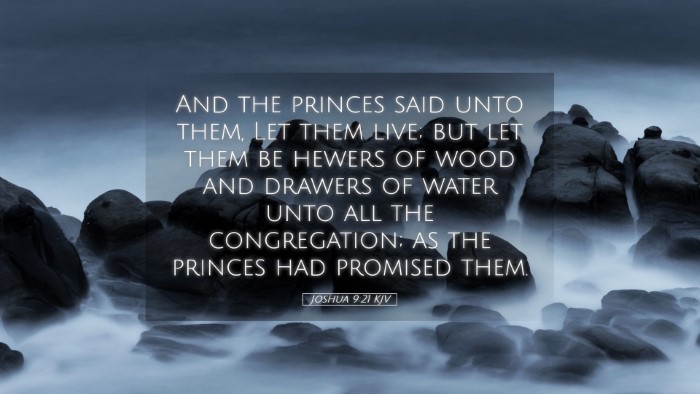Commentary on Joshua 9:21
The verse in question, Joshua 9:21, reads: "And the princes said unto them, Let them live; but let them be hewers of wood and drawers of water unto all the congregation; as the princes had promised them." This passage offers rich insights into the nature of covenant, mercy, and the dynamics of leadership, particularly in the context of the ancient Israelites.
Contextual Background
In order to appreciate the implications of this verse, it is essential to understand the broader context in which it is set. The Gibeonites, having deceived the Israelites into believing they were from a distant land, sought to secure their lives by making a covenant. This act places the Israelites in a position where they must navigate their commitment to their covenant with God versus their obligations to a people who falsely represented themselves.
Insights from Matthew Henry
Matthew Henry highlights the importance of the Israelites' integrity regarding the promises made to the Gibeonites. He asserts that although the Gibeonites' actions were deceptive, the princes recognized the need to honor the commitment made to them:
- Divine Mercy: The sparing of the Gibeonites illustrates God's providential care and mercy, even towards those outside the covenant community.
- Covenantal Responsibility: Henry emphasizes that their decision reflects a necessary adherence to covenant fidelity, illustrating how promises, once made, carry significant weight, reflecting God's character.
- Utility in Community: By assigning the Gibeonites roles as woodcutters and water carriers, the response typifies their integration into the Hebrew community while acknowledging their previous deception.
Insights from Albert Barnes
Albert Barnes offers a detailed exploration of the practical implications of this decision:
- Political Strategy: He notes that maintaining peace with the Gibeonites was pragmatically advantageous for the Israelites, given the geopolitical tensions of the time.
- Symbolism of Labor: The roles bestowed upon the Gibeonites serve a dual purpose: they not only fulfill a practical need but also symbolize their status as servants to the nation of Israel, reinforcing the notion that their deception necessitated a form of servitude.
- Teaching Moment: Barnes further posits that this incident teaches the importance of discernment and wisdom in leadership. The decision reflects a balance between justice, mercy, and practical concerns.
Insights from Adam Clarke
Adam Clarke provides a theological reflection on the consequences of Israel's choices:
- Theological Implications: Clarke argues that the Gibeonites’ servitude is indicative of God's sovereignty, using flawed human decisions to fulfill His greater purpose. The preservation of the Gibeonites, despite their deception, points to God's overarching governance even in human failures.
- Social Order: Clarke also notes that the roles assigned to the Gibeonites illustrate a societal order that was crucial for the Israelites' survival and thriving in the Promised Land.
- Integration of Outsiders: The passage reveals God's plan for the inclusion of Gentiles into His larger redemptive story, further foreshadowing New Testament themes of inclusion through Christ.
Theological Reflections
This incident and its implications reveal profound theological themes:
- Covenant and Integrity: The way the Israelite leaders address their covenantal obligations teaches modern Christians about the weight of promise-keeping in their relationships.
- Grace and Redemption: The sparing of the Gibeonites points forward to the grace embodied in the New Testament and serves as a reminder of God's redeeming love extended to all humanity, irrespective of their past.
- Leadership Dynamics: The decision-making process among the princes of Israel highlights a model for church leaders today, emphasizing the need for wisdom, discernment, and accountability in leadership.
Conclusion
In summary, Joshua 9:21 serves as a multifaceted passage that not only speaks to the historical realities faced by the Israelites but also resonates with contemporary issues of integrity, leadership, and divine mercy. By integrating insights from public domain commentaries, one can appreciate the rich theological landscape this verse provides for pastors, students, theologians, and scholars alike.


